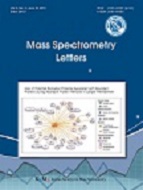
- P-ISSN 2233-4203
- E-ISSN 2093-8950

Defective synthesis of the steroid hormones by the adrenal cortex has profound effects on human development andhomeostasis. Due to the time-consuming chromatography procedure combined with mass spectrometry, the matrix-assisted laserdesorption ionization method coupled to the linear ion-trap tandem mass spectrometry (MALDI-LTQ-MS/MS) was developedfor quantitative analysis of 10 adrenal steroids in human serum. Although MALDI-MS can be introduced for its applicability asa high-throughput screening method, it has a limitation on reproducibility within and between samples, which renders poorreproducibility for quantification. For quantitative MALDI-MS/MS analysis, the stable-isotope labeled internal standards wereused and the conditions of crystallization were tested. The precision and accuracy were 3.1~35.5% and 83.8~138.5%, respectively,when a mixture of 10 mg/mL α-cyano-4-hydroxycinnamic acid in 0.2% TFA of 70% acetonitrile was used as the MALDImatrix. The limit of quantification ranged from 5 to 340 ng/mL, and the linearity as a correlation coefficient was higher than0.988 for all analytes in the calibration range. Clinical applications include quantitative analyses of patients with congenital adrenalhyperplasia. The devised MALDI-MS/MS technique could be successfully applied to diagnosis of clinical samples.
Riepe, F. G. (2007). . Rev. Endocr. Metab Disord, 8, 349-.
Wang, Y.. (2006). . J. Anal. Chem, 78, 164-.
Ha, Y. W.. (2009). . J. Chromatogr. B, 877, 4125-.
El-Aneed, A.. (2009). . Appl. Spectro. Rev, 44, 210-.
Galesio, M.. (2009). . Rapid. Commun. Mass Spectrom, 23, 1783-.
Sleno, L,. (2005). . Rapid. Commun. Mass Spectrom, 19, 1928-.
Tholey, A.. (2002). . J. Mass Spectrom, 37, 963-.
Kosanam, K.. (2007). . Anal. Chem, 79, 6020-.
Kampen, J. J.. (2009). . J. Mass Spectrom, 44, 1556-.
Guo, Z. (2007). . Anal. Bioanal. Chem, 387, 1939-.
Lastovickova, M.. (2009). . Int. J. Mass Spectrom, 281, 82-.
Carlson, A. D. (1999). . J. Steroid Biochem. Mol. Biol, 69, 19-.
Merke, D. P.. (2005). . Lancet, 365, 2125-.
Gobey, J.. (2005). . Corr, J. Anal. Chem, 77, 5643-.
White, P. C. (2000). . Endocr. Rev, 21, 245-.
Forest, M. G. (2004). . Hum. Reprod. Update, 10, 469-.